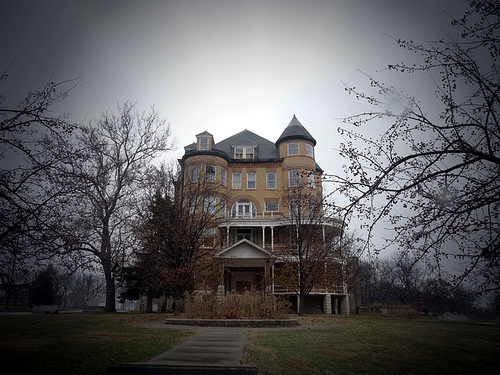This Creepy Kansas Asylum Is The Stuff Nightmares Are Made Of
Though no longer open and partially destroyed, 2700 W. 6th St. has left a stain on both Topeka and on the lives of so many of who visited throughout the years, whether voluntarily or not. First opened in 1879, this mental health facility and hospital was at one time well renowned and respected, but became tainted upon reports of rape, torture and neglect. The facility is the former Topeka State Hospital, and this is its story:
Built as an expansion of the already established Osawatomie State Hospital, Topeka State was a large facility built on more than 80 acres of land with the intent to serve the mentally and physically handicapped. As time went on, reports of heinous abuse from both the administration and faculty began to emerge, including allegations of severe neglect (one report claims that a patient was restrained by leather straps for so long that his skin began to grow around them), torture (by means of chains and starvation), and even sexual abuse.
During a thorough investigation initiated by then-Kansas Governor Frank Carlson, it was discovered that there was little to no paperwork for several of the admitted patients, and that instead of being treated, they were merely thrown in with the others, left to roam the hallways aimlessly. After Governor Carlson’s appointed committee published their report in 1948, funding for the hospital nearly doubled, corrupt staff members were let go, and social workers began evaluating and treating patients, even releasing some after proper therapy.
It wasn’t long after 1948 that Topeka State Hospital began gaining traction, discontinuing the act of forced sterilizations, and offering out-patient services to local community members. Business continued to go on as usual until 1992, when music and activity therapist Stephanie Uhlrig was brutally assaulted, murdered, and dumped in a facility bathroom by a patient. Uhlrig’s tragic death was eventually questioned and brought to the United State Court of Appeals, who stated that while her murder was “undeniably tragic, it was not the result of reckless and ‘conscience shocking’ conduct by the state mental health administrators sued in the instant case.”
Things continued to spiral downhill for the hospital after Uhlrig’s murder and, after losing its accreditation to receive Medicare and Medicaid, Topeka State Hospital was forced to finally close its doors for good in 1997.
Though most of the hospital has been demolished, those who pass the old Topeka State grounds report a feeling of eeriness… Maybe it’s the ghosts of those mistreated for so many years? While we may never know, one thing is for sure; the former Kansas asylum is the stuff nightmares are made of.
OnlyInYourState may earn compensation through affiliate links in this article. As an Amazon Associate, we earn from qualifying purchases.







